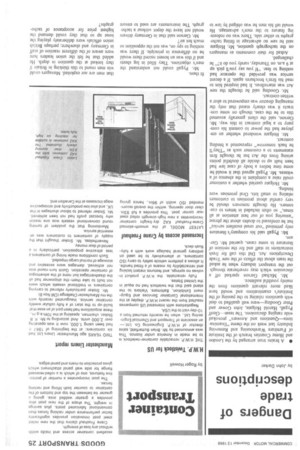Dangers of trade descriptions
Page 27

If you've noticed an error in this article please click here to report it so we can fix it.
by John Darker
• A brains trust arranged by the London and Home Counties branch of the Institute of Furniture Warehousing and Removing Industry last week on the theme "Examinations—Questions and Answers" provoked wide ranging discussions. The team—Geoff Pygall, Harold Holgate, John Gower and Peter Gooding—were well qualified to deal with questions relating to the passing of the Institute's examinations and would have liked more relevant questions from the mainly youthful audience.
Mr. Michael Gerson sparked off a discussion which may reverberate throughout the transport industry when he asked the team about the effects of the new Trade Descriptions Act. Did this call for fresh instructions to staff and for the revision of literature in some cases, queried Mr. Gerson.
Mr. Pygall said his company's literature only promised "out usual excellent service" but he confessed to doubts about the phrase "assuring you of our best attention at all times," so often included in letters to customers. He thought removers should be very careful about promises to customers relating to small lots. Oral promises were binding.
Mr. Holgate queried whether a customer could raise a complaint in the absence of a witness. Mr. Pygall agreed that it would be some time before a body of case law had been built up to decide all doubtful points arising from the Act but he thought firm statements to a customer such as "They'll be back tomorrow" represented a binding contract.
Mr. Holgate wondered whether an employee had the power to commit his company to a legal contract in this way. Mr. Gerson, said the client generally assumed this to be the case, though on some contracts it was clearly stated that only the managing director was empowered to alter a written contract.
Mr. Gooding said he thought the new Act was Marvellous. It had inspired him to read his firm's brochures again. If a decent service was provided the operator had nothing to fear. "If you say you'll pick up at 9 a.m. on Thursday, surely you do it?" he challenged.
Asked for their comments as managers on the tachograph question, Mr. Holgate said he saw no advantage in fitting tachographs to either side. There was no redeeming feature to the men's advantage. He would tell his men he was obliged by law to fit them.
Mr. Pygall could not understand the men's objections. They filled in log sheets and if this was an honest record there would be no difference in principle. If there was nothing to spy on, was not the opposition so much hot air?
Mr. Gerson said that in Germany drivers would not leave the depot without a tachograph. The instruments are used to ensure that men are not exploited. Managers could win men round to this thinking in tritain if they looked at the question in depth. He added that he felt the union leaders here were aware of the different reaction of staff in Germany and elsewhere; perhaps British union officials were deliberately playing the issue up so that they could demand the highest price for acceptance of tachographs?












































































































